You've got several effective options to fix scratched phone camera lenses. For minor scuffs, try the toothpaste polishing technique using non-abrasive white toothpaste. Deeper scratches might require glass etching cream, which chemically removes a thin layer of glass. The sandpaper buffing method can be effective with proper grit and technique. If you're not confident in DIY repairs, professional lens repair services offer specialized knowledge and tools. To prevent future scratches, consider regularly replacing your lens's protective film. Each method has its pros and cons, so it's essential to choose the right approach for your specific situation.
Toothpaste Polishing Technique
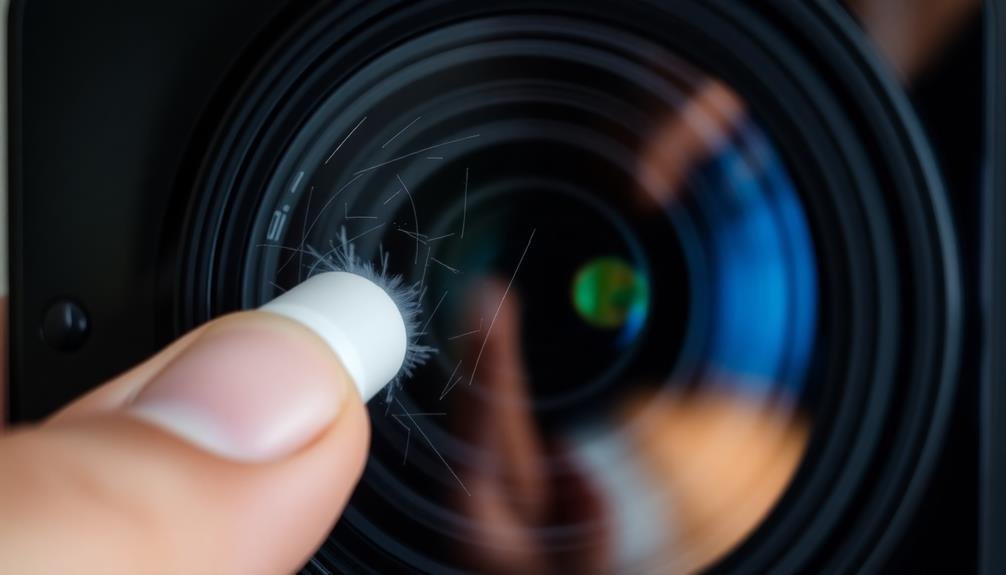
One of the most popular DIY methods for fixing scratched phone camera lenses is the toothpaste polishing technique. This method works best for minor scratches and scuffs on the lens surface.
To begin, you'll need a small amount of non-abrasive, white toothpaste and a soft microfiber cloth.
First, clean your phone's camera lens thoroughly with a lens cleaning solution or isopropyl alcohol. Once dry, apply a tiny dab of toothpaste to the scratched area. Using gentle, circular motions, rub the toothpaste into the scratch with the microfiber cloth for about 30 seconds.
Be careful not to apply too much pressure, as this could damage the lens further.
After polishing, wipe away the excess toothpaste with a clean, damp cloth. Inspect the lens to see if the scratch has improved. If necessary, repeat the process, but don't overdo it.
The toothpaste's mild abrasives work by removing a thin layer of glass, effectively "sanding down" the scratch. However, excessive use can damage the lens coating or create new scratches.
If you don't see improvement after a few attempts, consider professional repair options.
Glass Etching Cream Application
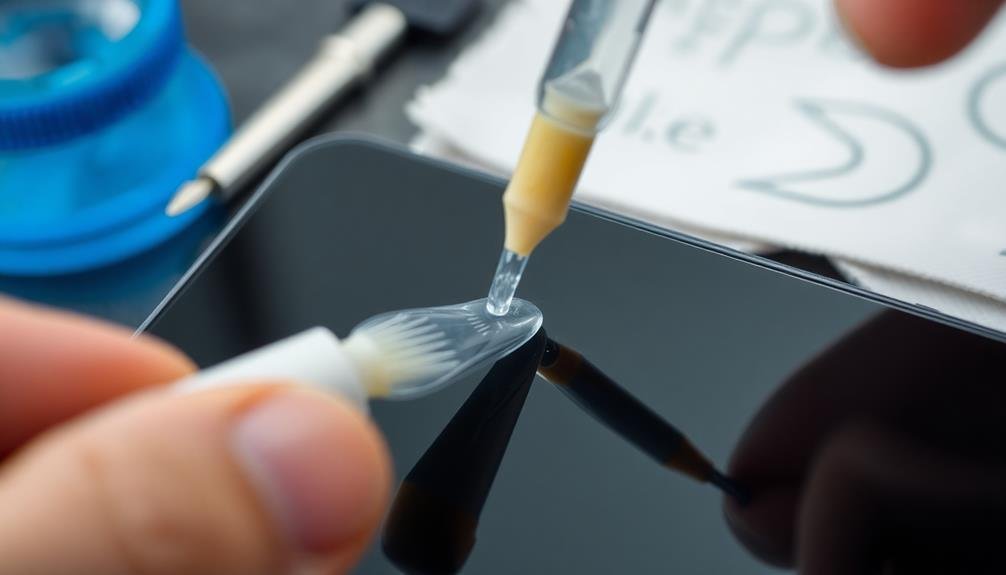
Glass etching cream offers a more potent solution for deeper scratches on phone camera lenses. This method works by chemically removing a thin layer of glass, effectively leveling out the scratched area.
However, it's essential to use this technique with extreme caution, as it can cause permanent damage if not applied correctly.
Before you begin, clean your lens thoroughly and protect the surrounding areas with tape. Apply a small amount of glass etching cream to the scratch using a cotton swab. Leave it on for the recommended time, usually no more than a minute. Rinse the cream off completely with water and dry the lens with a microfiber cloth.
To guarantee the best results when using glass etching cream:
- Choose a cream specifically designed for glass, not plastic or metal
- Work in a well-ventilated area and wear protective gloves
- Test the cream on a small, inconspicuous area first
Remember that this method is irreversible and should only be used as a last resort. If you're unsure about your ability to perform this technique safely, it's best to seek professional help to avoid potentially ruining your phone's camera lens.
Sandpaper Buffing Method
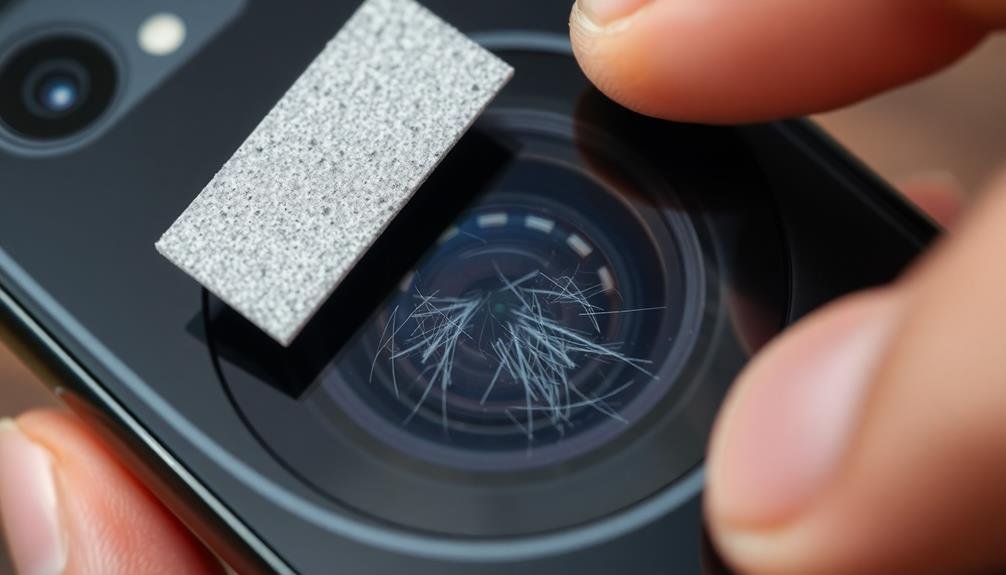
You might be surprised to learn that sandpaper can be an effective tool for removing scratches from phone camera lenses. However, it's essential to use the right grit and technique to avoid causing further damage.
Start with ultra-fine grit sandpaper (3000-5000 grit) and work your way up if needed. Gently buff the scratched area in circular motions, applying minimal pressure. Keep the lens slightly damp with water to reduce friction and prevent debris buildup.
Here's a guide to help you choose the right sandpaper grit:
| Scratch Depth | Sandpaper Grit | Buffing Time |
|---|---|---|
| Very Light | 5000 | 30 seconds |
| Light | 3000 | 1 minute |
| Moderate | 2000 | 2 minutes |
| Deep | 1500 | 3 minutes |
After buffing, clean the lens with a microfiber cloth and inspect your progress. If scratches remain, repeat the process with a slightly lower grit. Once satisfied, polish the lens with a specialized lens polishing compound to restore clarity.
Professional Lens Repair Services
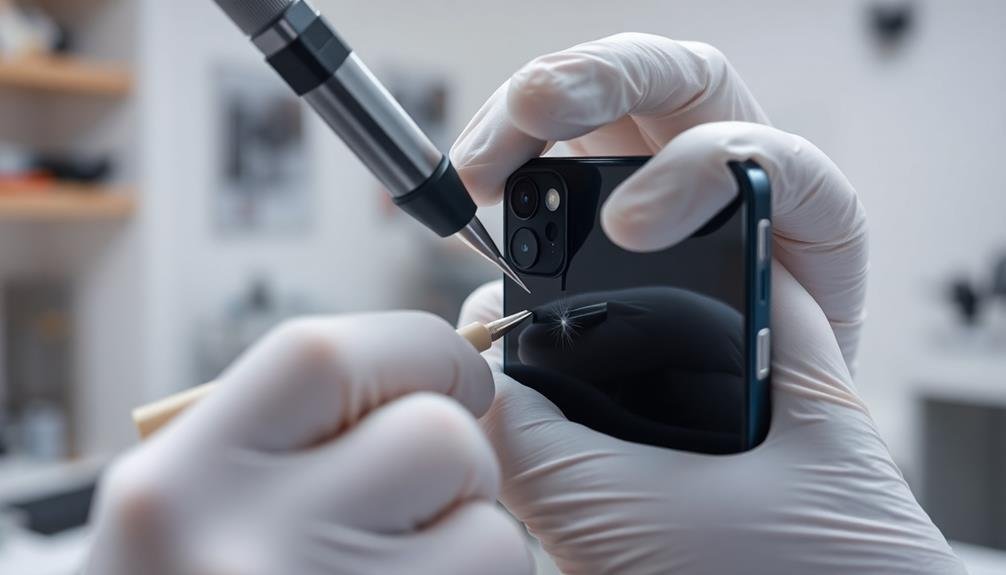
While DIY methods can be effective, sometimes it's best to leave complex repairs to the experts.
Professional lens repair services offer specialized knowledge and tools to fix scratched phone camera lenses. These services can often restore your lens to its original condition, ensuring peak image quality and performance.
When considering professional repair, look for reputable shops with experience in mobile device repairs. Many authorized service centers and third-party repair shops offer camera lens repair services. They'll assess the damage and provide an estimate before proceeding with the repair.
Here are three benefits of choosing professional lens repair services:
- Expertise: Technicians are trained to handle delicate components and have access to specialized tools.
- Warranty: Many professional repairs come with a warranty, giving you peace of mind.
- Time-saving: You'll avoid the trial and error often associated with DIY methods.
Keep in mind that professional repairs may be more expensive than DIY solutions, but they often provide better results.
If your phone is still under warranty, check with the manufacturer first, as they may cover the repair cost. Always weigh the cost of repair against the value of your device before deciding on a course of action.
Protective Film Replacement Strategy

A proactive approach to protecting your phone's camera lens involves replacing the protective film regularly. This strategy can help prevent scratches and maintain your camera's image quality.
You'll find various types of protective films available, including tempered glass and plastic options. When choosing a film, consider factors like durability, clarity, and ease of application.
To replace the protective film, start by thoroughly cleaning your phone's camera lens. Remove any dust or debris using a microfiber cloth and lens cleaner.
Carefully peel off the old protective film, if present. Align the new film precisely over the camera lens, ensuring there are no air bubbles or misalignments. Use the included applicator tool to smooth out any imperfections.
It's recommended to replace the protective film every few months or when you notice signs of wear. This practice helps maintain a clear, scratch-free surface for your camera lens.
Frequently Asked Questions
Can Scratched Camera Lenses Affect the Quality of Photos Taken?
Yes, scratched camera lenses can definitely impact your photo quality. You'll notice blurry spots, reduced sharpness, and potential light distortions in your images. Even minor scratches can affect your camera's performance, so it's best to protect your lens.
How Often Should I Clean My Phone's Camera Lens?
You should clean your phone's camera lens regularly, ideally once a week. If you use your camera frequently, clean it more often. A quick wipe with a microfiber cloth can prevent smudges and maintain image quality.
Are There Any Preventive Measures to Avoid Scratching Phone Camera Lenses?
You can prevent scratches on your phone's camera lens by using a protective case, avoiding placing your phone face-down, keeping it away from keys and coins, and applying a screen protector that covers the lens area.
Can Screen Protectors Also Protect the Camera Lens?
You can find specialized camera lens protectors for your phone. While regular screen protectors won't fit, these lens-specific protectors offer excellent scratch resistance. They're easy to apply and won't interfere with your photo quality.
Do Phone Cases With Raised Edges Protect the Camera Lens From Scratches?
Yes, phone cases with raised edges can protect your camera lens from scratches. They create a barrier between your lens and surfaces when you set your phone down. You'll want to choose a case with sufficient elevation around the camera area.
In Summary
You've now got several options to tackle those pesky camera lens scratches on your phone. Whether you're feeling adventurous with DIY methods like toothpaste or sandpaper, or you'd prefer a professional touch, there's a solution for every situation. Don't forget to contemplate preventive measures, like protective films, to avoid future scratches. With these techniques at your disposal, you'll be back to snapping crystal-clear photos in no time. Remember, a little care goes a long way!

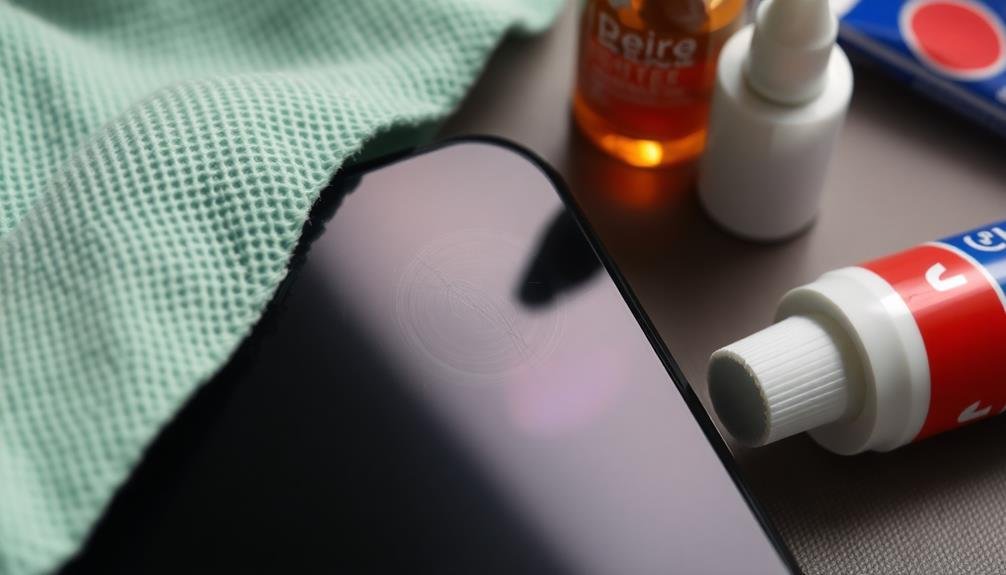

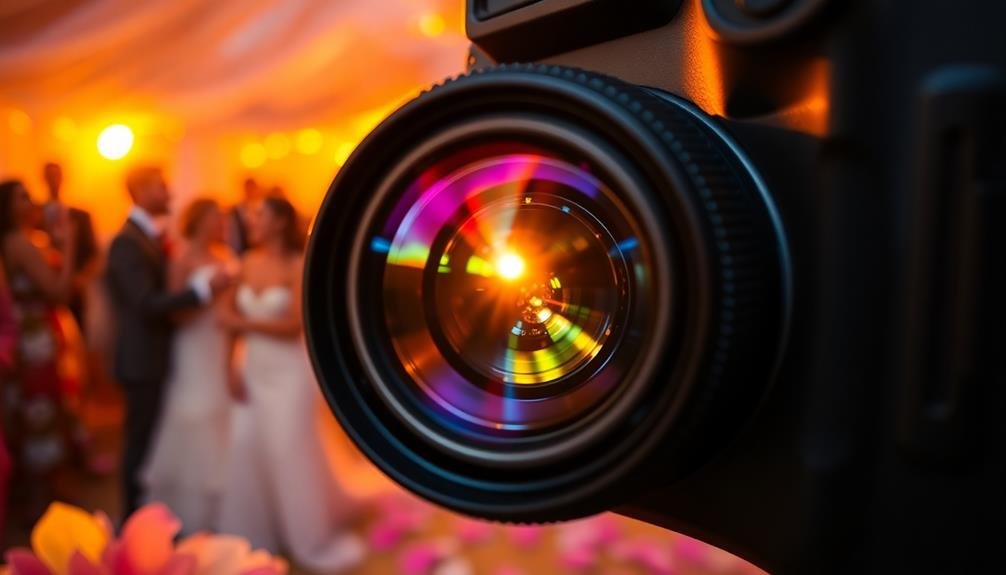

Leave a Reply